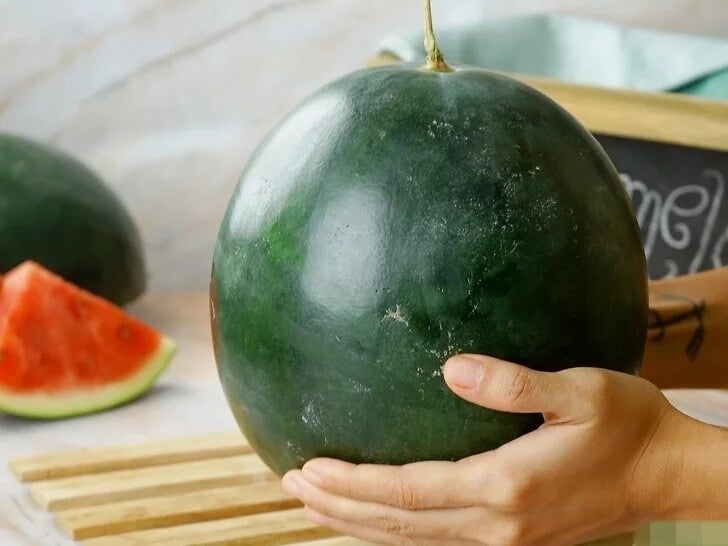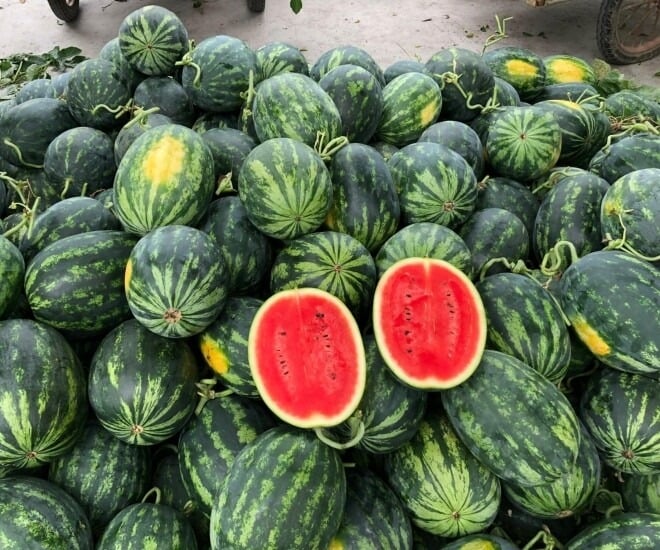Why do many people refrain from offering watermelon at their ancestral altars for worship?
Watermelon is a fruit that many families avoid placing on their ancestral altars. The primary reason for this stems from the fact that watermelons grow on the ground, from the time the plant sprouts until harvest. When sold, watermelons are often piled on sidewalks or mats at markets, where they may absorb negative energy and impurities from the environment, especially from fertilizers and soil.
In contrast, ancestral altars are considered sacred spaces that require purity and cleanliness to maintain a harmonious spiritual field for worship. Therefore, many families opt for fruits that grow on higher branches, believed to be purer.

Watermelon is often avoided as an offering on ancestral altars.
However, some people argue that the word for “watermelon” in Vietnamese, “dưa hấu,” is similar to the word “dư,” which signifies abundance, fullness, and wealth. Additionally, the round shape, red flesh, green rind, and juicy nature of watermelons symbolize completeness and family reunion. This fruit is also regarded as a symbol of fortune, luck, and a smooth life.
Consequently, the decision to offer watermelon at ancestral altars depends on the beliefs of individual families and regional customs. If one chooses to use watermelon, the following considerations should be kept in mind:
– Select a moderately sized watermelon that suits the dimensions of the altar. If the altar is hung high, avoid choosing an overly large and heavy fruit, which may cause inconvenience during worship or risk breaking the altar.
– Opt for watermelons with a deep green rind and fresh stems. Refrain from choosing fruits that appear wilted, have insubstantial, pale, or dry flesh, or lack sufficient juice.
– Prior to presenting the watermelon at the altar, thoroughly wash and dry its rind to prevent dust and water stains.

It is advisable to wash and dry the watermelon rind before offering it at the ancestral altar.
If using watermelon for worship, it should not be left for an extended period, as even though the outer rind may appear fresh, the hot conditions can cause the fruit to spoil quickly.
Fruits to Avoid Placing on Ancestral Altars for Worship
On special occasions such as the first and fifteenth days of the lunar month, festivals, New Year celebrations, or death anniversaries, we often select fruits to offer at our ancestral altars. However, not all fruits are suitable for this purpose. The following is a list of fruits that should be avoided for worship:
Artificial fruits: Using artificial or fake fruits is considered disrespectful to ancestors and deities. Instead, opt for fresh fruits to demonstrate sincerity and reverence.
Fruits with sour, bitter, or spicy flavors: Fruits like bitter melon, chili peppers, and lemons are not suitable for offerings as they symbolize bitterness and hardship in life. Presenting these fruits may bring bad luck to the family.
Fruits that grow close to the ground: Fruits like watermelons and pears are more susceptible to absorbing impurities from the soil and fertilizers. Therefore, it is best to refrain from using them for ancestral worship.
Fruits with strong odors: Fruits like jackfruit and durian have potent aromas that can overpower the fragrance of other offerings and disrupt the tranquility of the worship space. Thus, these fruits are not recommended.
Overripe fruits: Fruits that are overly ripe can attract insects like fruit flies, compromising the solemnity of the worship area. It is best to exclude such fruits from offerings.
Fruits with rough, prickly skins: Fruits with prickly skins, like prickly pears, are believed to bring disharmony and anxiety to the family, according to folk beliefs. Therefore, it is advisable to avoid placing them on ancestral altars.
In conclusion, the selection of fruits for ancestral worship not only demonstrates reverence but also requires consideration of spiritual factors. Careful thought should be given to show respect for ancestors and deities.
The Secret to a Succulent Summer: Why Watermelons Are a Tasty Treat, but a No-Go on the Family Altar
Watermelon is a delicious and refreshing fruit, with its vibrant red flesh and juicy sweetness, it is a favorite for many during the summer months. However, there is a curious taboo surrounding this fruit in certain cultures. Some people refrain from placing watermelons on their altars or shrines, but why is this?
The Hive’s Warning: Never Lend or Borrow a Comb
Introducing the humble hairbrush – a familiar daily essential, but did you know there’s a long-held superstition around lending it to others? It’s time to unravel the mystery behind this curious taboo.
The belief stems from an old wives’ tale that lending your hairbrush could lead to a transfer of energy and, with it, a host of potential problems. From bad luck and tangled relationships to, quite literally, tangled hair, the consequences were thought to be far-reaching.
So, next time you’re tempted to lend a friend your hairbrush, remember the age-old superstition and perhaps offer a hair tie instead! It’s always better to be safe than sorry, especially when it comes to maintaining smooth locks and a smooth life.





































